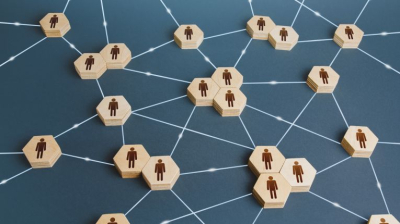Wall-Street: How did networking look when you have started in this field and how does it look now? What changes can be noticed?
Andy Lopata: I started networking in the UK in 1999. Networking was less well known then although organizations like Chambers of Commerce had been around for a long time. Most events typically saw people trying to sell to one another, with attendees at events trying to meet as many people as possible and collect business cards from everyone they could.
Networking was also something that almost exclusively involved small businesses and meetings were fairly general. Although some of the same behavior can still be seen at events, a large proportion of people who network now understand that they need to meet people with whom they can build relationships. People can also connect with each other online and establish deeper relationships by keeping in touch there.
Networking has become a more accepted tool for larger business. Although you still have events that are mainly for small business, there is a greater variety of events and networking opportunities for people in certain industries, with the same professional or personal interests or with the same outlook or philosophy. Corporates will hold networking events internally for their staff to mix with and learn from each other and to spend more time with their clients.
Wall-Street: Did the rapid evolution of social media changed in any way the way we communicate with each other?
Andy Lopata: The growth of social media has raised the profile and respectability of networking by bringing it into everyone's life. As much as some may try to avoid it, everyone is aware of Facebook and Twitter, and most people in business are aware of LinkedIn. While there is still a lot of distrust of these media and little understanding about how to use them effectively, suddenly people realize that they have a network that they should be engaging with. At events many people get nervous about approaching strangers, online it feels much safer. The problem is that much less thought goes into making the connection. Many people will simply send a connection request to someone they've never met, without even introducing themselves or explaining why.
Many still believe that the more connections they make the more successful they will be, and there are many who subscribe to this view. There is still a lot of work to be done to change that belief.
Wall-Street: How important is social media in today’s networking?
Andy Lopata: Social media allows us to manage much larger networks and keep in touch with more people than we could have done before. Another key benefit of social media is its viral capabilities. During my talk in Bucharest we had a live Twitter stream for the Conference. I posted the same questions on Twitter that I did to the audience. People in the audience responded on Twitter and so did some of my connections in the UK. As a result of that many people who didn't previously know me saw those responses, and other comments made by people on my talk and started to follow me on Twitter.
Social media allows you to share more of you with your network, allowing them to find out more both personally and professionally and also easily share that information with others who may be interested. It's a very powerful tool for businesses who want to grow their profile.
Finally, LinkedIn has one supreme advantage for people networking for their business or career.
Wall-Street: What disadvantages social media has in the development of a solid and reliable network?
Andy Lopata: If people simply look at building numbers of contacts on social networks rather than building relationships, they will gain little benefit. In fact, the larger your network becomes that harder it is to find the right people at the right time. Sometimes it can feel like looking for a needle in a haystack.
There is also the danger that people let their standards of behavior slip below those they would have at a professional networking event. For example, it's too easy to turn on your computer late at night after a few drinks and post something that you may not have posted when sober! It's very hard to turn back the clock on the internet, what you post stays there.
Allied to this is the problem that you cannot get across the meaning of your words on the internet as easily as in person. Tone of voice, body language and eye contact all play a major part in putting your words into context. As you can't use these online, it is easy for humor to be misinterpreted and relationships to become strained.
Wall-Street: Can you name 5 tips for a good networking activity?
Andy Lopata: 1. Pursue the relationship, not the sale. Don't try to sell to the people you meet when you network. If business development is what you are looking for, sell through them to the people they know. If they want then to buy from you, that is different. But it becomes their decision.
2. Be courageous - When you go to networking events to meet new people, find the strength to overcome your nerves and approach them.
3. Be committed to the process - Understand your objectives from networking and what you have to do to achieve them. Stick to the necessary actions and measure your progress.
4. Be committed to the people in the process - Be there to support the people in your network, offer them the connections they need and listen actively to what they say without worrying about yourself.
5. Be patient - The best results won't come overnight. You need to build people's trust in you and understanding of how they can help before turning to them for support. You need to support them first and develop the relationship. It all takes time.
Wall-Street: Also, can you give us 5 examples of mistakes that should be avoided in networking?
Andy Lopata: 1. Not asking for support when people are willing to offer it.
2. Not following up with the people you've met. Make sure you do what you have promised to do and within good time. A business card collected has little value unless a conversation follows.
3. Attending events or joining networking groups without understanding why. If you have no clear objectives you will achieve much less that you could potentially achieve if you target your activity.
4. Writing off people as not useful for you to know. You don't know who people know or how they may be able to help you. Additionally, sometimes you will help some people who can't help you, but someone else will do the same for you. Networking isn't always about directly reciprocal support, it is about a culture of people helping each other without the expectation of a direct return.
5. Failing to be clear about the help you need. Keep requests for help simple, targeted and easy to understand. The more you give people to remember, the more they'll have to forget, so don't overload people with information.
Wall-Street: Why is networking important in such economical context? How does it help a company?
Andy Lopata: The more people you develop a relationship with, the more people will talk to others about you in a positive way, recognize people who need your help and make the introductions you need. Networking internally within a company means that staff talk to each other and operate more effectively. Many companies are split into silos, individual departments all working to their own agenda and focused on their own targets. Often this can be to the detriment of the customer or of getting the job done in the most effective way. Encouraging staff to interact with each other support each others' objectives and targets leads to a much more efficient operation.
Wall-Street: Did the crisis influence in any way networking? How?
Andy Lopata: While networking has always been important, the economic situation has brought that to the fore. The money available for companies to advertise in more traditional ways is no longer available and so they are more reliant on word of mouth than ever before. Networking is an inexpensive and cost-effective way to market a business, something that has never been more important.
Additionally networking's profile has risen because of the number of redundancies that have been made. With an entrepreneurial culture in the UK, when people are made redundant many of them look to set up their own business. That means that there is more competition in a smaller network and networks are essential to find the connections and build the profile you need to succeed as an entrepreneur.
Those people who have been made redundant and want to stay employed soon learn that traditional routes to finding jobs, such as responding to advertisements and going to recruitment consultants, are not sufficient. Many jobs are filled before they reach that stage. The best way to find new work is through your own network.
Wall-Street: What particularities have you found in the way people network in different countries?
Andy Lopata: I don't believe that there are as many differences as people believe, mainly because ultimately networking is simply about people helping each other. I think the main difference is the stage of development of and respect for networking. In other countries there will be more skepticism and cynicism. This is more about the popularity of networking than national difference.
Citeste si:
Calculator Salariu: Află câți bani primești în mână în funcție de salariul brut »
Te-ar putea interesa și:


















































































![HR [PLAY] Tech Workout - 11...](https://www.wall-street.ro/image_thumbs/thumbs/973/973fe0a3888d417feff63de42e814180-260x260-00-65.jpg?v=1713971983)









